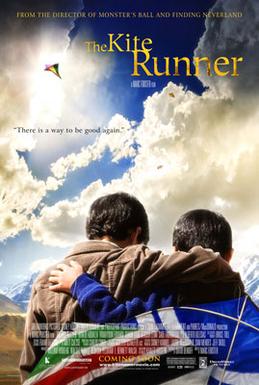Post by Return of the Thin Olive Duke on Sept 27, 2016 21:51:07 GMT -5

The Kite Runner
Dir. Marc Forster
Premiered December 14, 2007
I don’t know how widespread this is, but in the United States, we have a scholastic tradition called summer reading, whereby schools assign books to students over the summer to be discussed and tested on at the start of the school year. Oddly, my last summer reading assignment ever was Khaled Hosseini’s bestselling novel The Kite Runner. I say oddly because my senior English course was British Literature, and Hosseini has no relation to the British Isles.
Most likely, the inclusion of The Kite Runner was rooted in a desire to connect our studies with current events and contemporary popular literature. Coincidentally, the year was 2007, and it wasn’t long after I finished the book when trailers for Marc Forster’s film adaptation began appearing on television– albeit rarely. By non-youth literary standards, The Kite Runner was a huge deal, but the movie came and went. Upon watching, I understood why: The Kite Runner is a perfectly faithful adaptation and a totally unimaginative film.
The story begins in 1970s Afghanistan, in the final days of the monarchy. Young Amir Qadiri (Khalid Abdalla) lives in a middle-class home in cosmopolitan Kabul with his widowed father (Homayoun Ershadi), a sometimes aloof but morally incorruptible man whose outspoken moderation puts him in conflict with religion and the Communists– the latter of whom soon seize power.
Amir and his father also live with their servant Ali and his son Hassan (Ahmad Khan Mahmizada). Amir is friends with Hassan, who is an outcast due to his minority Hazara background, but is frustrated that Hassan is so deferential toward him. This culminates in the aftermath of a traditional kite-flying competition in which Hassan tracks down a lost kite in an alley, only to be beaten and raped by teenage bully/Pashto supremacist Assef (Elham Essas).
Amir’s guilt over not defending his friend overpowers him, even after the Soviet invasion forces him and his father to leave for California, where he grows up, begins writing in earnest, falls in love and marries fellow refugee Soraya (Atossa Leoni), loses his father to cancer, and fails to have children. Suddenly, he receives word from his father’s dying friend Rahim Khan (Shaun Toub) that Hassan, now dead by the hand ascendant Taliban, was Amir’s bastard half-brother, and that Amir is responsible for recovering Hassan’s orphan son.
The Kite Runner in its original form was an engaging and wonderfully detailed reflection on the modern Afghani experience; it’s not one of my favorite books, but it does a great job of bringing a taste of that life to the reader. The film not so much. David Benioff’s script is perfectly fine, as are the performances. But as far as direction is concerned, it feels as if Marc Forster simply had the cast and crew read the book. The cinematography, blocking, editing, and visual effects are all off in some difficult-to-grasp fashion. The result is a perfunctory adaptation; it exists because that’s what happens to bestselling novels. Anyone who hasn’t read the book won’t be interested, and anyone who has won’t get anything new out of it.
Additional Notes
Add Marc Forster to the list of people who have disappointed me since Stranger Than Fiction.
Next Time: Youth Without Youth
Additional Notes
Add Marc Forster to the list of people who have disappointed me since Stranger Than Fiction.
Next Time: Youth Without Youth

